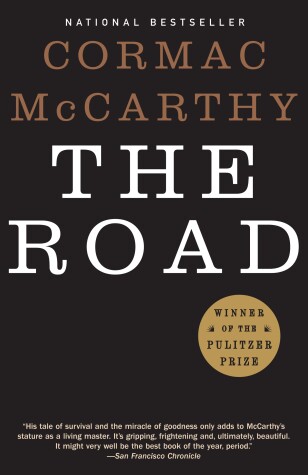Reviewed by Briana @ Pages Unbound on
So for much of the book I was thinking, "I get it. They're walking around, looking for abandoned canned food no one else has looted, pushing their lives in a shopping cart and trying to avoid other people on the road because you never know who's going to shoot you." And I have read so many books like this. Once in a while, the boy and the father ponder their fate or the fate of humanity. The real problem is: I have read books that have a very similar world-building (Angelfall by Susan Ee comes to mind), but which also have a plot. So The Road didn't impress me.
I know the book has some status as school required reading, so it's hard to dismiss it entirely. There are some things about it that are philosophically interesting, if one is willing to dig about for them. The relationship between the boy and his father is particularly worth a second look for anyone reading this academically. And it asks some questions that are basically dystopian/postapocalyptic staples: What does it mean to be human? What is it ethical to do in the pursuit of survival? Is there really a clear line between the "good guys" and the "bad guys?" But, since these are questions practically inherent to the genre, I'm not sure I can say there's anything specially compelling about the way they're raised in The Road, if it's worth reading this book over other books from the genre.
The Road is solid, but I've seen so much that's similar that I simply can't be excited about it. It just seems so standard, except with a particularly literary fiction type of style (mixing up the chronology, not clearly indicating who's speaking, etc.), and the style simply doesn't compensate for the lack of original thought or content.
Reading updates
- Started reading
- 21 May, 2016: Finished reading
- 21 May, 2016: Reviewed
